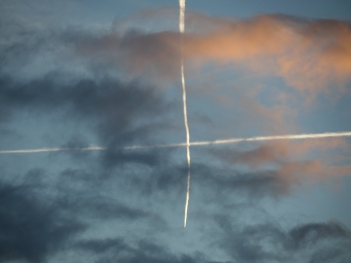We are now into the sixteenth year of the twenty first century, but it’s hard to believe it. Mankind has created the most scientific and technological society that has ever existed on this planet, and yet we are still surrounded by primitive superstition that would stop it dead in its tracks if it can ever get away with it.
Although I was brought up within a religious and superstitious family, I was able to notice after I left school and got out into the big wide world that the religious beliefs, superstition and, frankly, bigotry that I was taught as I was growing up, just didn’t match my own observations. And after several decades of those observations, I conclude that reality, supported by testable and confirmable evidence, is more reliable than (and preferable to) untestable and unconfirmable belief or faith.
Look around you and notice things. While the religious zealots are torturing and killing people, science has landed a spacecraft on a comet half a billion miles from Earth. It’s easier, I’m sure (although I couldn’t do it myself), to kill someone in the name of some god or other than it is to study science for years and do positive things that no amount of prayer will ever achieve.
Is the paranormal real? It’s certainly easier to make excuses for why psi claims don’t actually work than it is to produce the claimed effects. And just as easy to whine that those like me – sceptics – are just nay-saying curmudgeons who are just “desperate to protect their world view.”
Do the quack nostrums of homeopathy, chiropractic, faith healing, reiki and all the rest of the nonsense peddled for profit by (maybe some) well-meaning but unqualified (in scientific terms) practitioners do any real good for people? Someone suffering an ailment might be able to say honestly during such treatment (self-reporting) that they actually “feel better” as they undergo that “treatment,” but that is not the same as actually being cured. Germs and cancers do not disappear as a result of quackery, even if the sufferer has, as they often say, even with the latest medical treatment, “good days and bad days.”
Will your horoscope in the daily newspaper really be accurate today? Or maybe it would be better to pay through the nose for a personalised chart that will give you nothing other than a self-fulfilling prophecy – as long as you interpret it in the way that confirms your expectations and beliefs after the events you think they are predicting.
It could be that you will consult any pro paranormal website or blog that tells you why sceptics are “wrong in their beliefs” but don’t provide any testable evidence for that claim, which is really just sour grapes because the woomeisters have to face the fact that rational, scientifically literate people don’t go along with belief over testable evidence.
I could go on and on about all of the superstitions people prefer over actual reality, but by now if you have read this far, you might be starting to understand my frustration. I am one of those people that the paranormal promoters call, disdainfully, a “materialist!” Even worse than that, I am what they call (gasp, shock-horror) a “pseudosceptic,” one of those rationalists who don’t believe without question the paranormal anecdotes presented to me.
What can I say to it all, except, do you deny that the universe we inhabit does, in fact, have an actual material existence? I have to wonder why, but get no answer to the question, how can the “immaterial” exist for a start off, and how can it affect or interact with, the actual material (real) universe we all live in? Why don’t the physical laws of nature prevail over the immaterial (non-existent) “laws” of, er… the paranormal? In fact, what (physical or non-physical) laws control this immaterial paranormal “energy” or whatever it is? Where is the actual theory of the paranormal? (And when I say theory, I mean “theory” in the scientific sense.)
There is no such theory. A scientific theory can exist only if there is something there that can be shown (with a high degree of probability) to exist. At the moment, as has been going on for over a hundred and fifty years, paranormal investigators are still trying to show that there is anything paranormal going on at all. None of that has been demonstrated conclusively; so far, there is no compelling reason to think any of it is true.
And yet, no one needs any supposedly precognitive ability to just know that the year 2016 is going to be another non-stop tsunami of woo. That will include everything from serious paranormal researchers failing again to prove their claims, to outright frauds bilking the gullible for personal profit. There will also of course be well-meaning but off-beam believers spouting incorrect claims supported by totally wrong assumptions about the nature of, well… nature itself.
I will say this yet again: I do not believe in the existence of the paranormal or the supernatural, but my mind can be changed if anyone can prove the claims they make. However, those claims will have to meet the rigorous standards required by science, which does not mean someone’s heartfelt belief, or a single experiment that no one else can replicate, or an anecdote from some “eminent person of good character,” or any number of ad hoc rationalisations to explain what is maybe anomalous but not necessarily paranormal.
And don’t get me started about conspiracy theories:
“Chemtrails for Jesus,” perhaps.
In 2016 we are going to see more TV shows, books, and everything else about UFOs, ghosts, and all manner of irrational nonsense, supported by ignorant people who are willing to subscribe to it all and therefore pay for and perpetuate a kind of mind-numbing, modern-day “opiate for the masses.” Sensible programming about science – the true reality programmes – are (still) going to be side-lined, or given the least prominence because actual reality does not have the same commercial value to TV producers. That’s a shame, but it illustrates the problem.
For the forthcoming year of 2016 CE, I wish all of my readers a Rational New Year and freedom from Bad Thinking, while I continue trying to do my bit to fly the flag of reason. Wish me luck. (No, not luck, it doesn’t work like that… er, no, it really doesn’t; it’s a struggle.)








